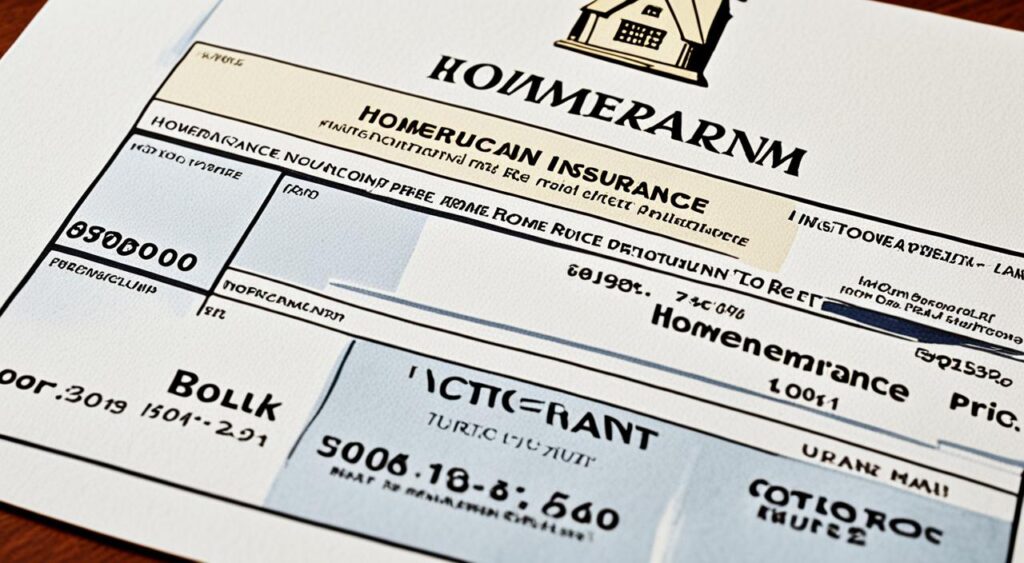An insurance premium is what you pay regularly to get coverage from an insurer against possible losses. It’s kind of like rent because you pay both regularly to keep your coverage or living space. But, insurance premiums and rent have big differences too. We’ll look at how insurance premiums and rent are similar and different. We’ll also dive into understanding insurance premiums. This means knowing how they’re priced, what makes them change, and tips to lower them.
Key Takeaways
- An insurance premium is a recurring payment made to an insurer to maintain coverage against potential risks or losses.
- Insurance premiums and rent share similarities in requiring regular payments, but they differ in the nature of the coverage provided.
- Factors such as risk assessment, coverage type, and policyholder profile influence the cost of insurance premiums.
- Strategies like raising deductibles, bundling policies, and maintaining good credit can help reduce insurance premiums.
- Incorporating insurance premiums into a comprehensive financial plan is crucial for effective budgeting and cost management.
Understanding Insurance Premiums
An insurance premium is what someone or a company pays to an insurance firm for an insurance policy. It covers losses or risks like property damage, liability claims, or someone’s passing. Insurance premiums can be due every month, or every few months, or even once a year.
What is an Insurance Premium?
The definition of an insurance premium is the price of an insurance policy someone must pay to keep their coverage. These funds are key for insurers to pay claims and run their businesses. Knowing about insurance premiums helps people and firms better handle risks and finances.
Types of Insurance Premiums
Policyholders could face many types of insurance premiums, depending on their coverage. Common examples of these insurance premiums are:
- Homeowners insurance premiums
- Auto insurance premiums
- Life insurance premiums
- Health insurance premiums
- Renters insurance premiums
- Business insurance premiums
Each type of insurance premium is calculated for the policyholder’s unique risks and cover needs. This gives a detailed look into insurance premiums and their aspects.
Insurance Premium vs. Rent

Insurance premiums and rent are alike in some ways, yet very different. Both need regular payments to keep up coverage or where you live. They are key costs for people and families.
Similarities Between Insurance Premiums and Rent
The key point about insurance premiums and rent is they need regular payments. Paying rent means you can stay and use a place. For insurance premiums, it’s about covering risks or losses.
Both of these costs are crucial and must be planned for. This is true in both personal and business budgets.
Differences Between Insurance Premiums and Rent
Though they share similarities, the aims they serve are quite different. Paying rent lets you actually use a space. What you pay in insurance premiums looks after you against risks.
Rent doesn’t help you save money for the future. But, some insurance types, like whole life, can gain value as time goes on.
| Comparison | Insurance Premium | Rent |
|---|---|---|
| Purpose | Provides coverage against potential risks or losses | Provides the right to occupy and use a physical property |
| Equity/Cash Value | Can build cash value over time (e.g., whole life insurance) | Does not typically build any equity or cash value |
| Payment Frequency | Can be paid monthly, quarterly, semi-annually, or annually | Typically paid monthly |
| Mandatory Requirement | Mandatory for certain types of insurance (e.g., auto, homeowners) | Mandatory for occupying a rented property |
To sum up, insurance premiums and rent are both vital but very different. They vary in what they cover, if they help you save over time, and how often you pay.
Factors Influencing Insurance Premiums

Insurers look at many things to decide how much to charge you for insurance. They check your risk level and see what kind of coverage you need. The main factors that decide your insurance cost are:
Risk Assessment
Insurance companies check how likely you are to make a claim. They look at your claim history, what you’re insuring, and if you might claim in the future. If you’re seen as more likely to claim, your premiums could be higher.
Coverage Type and Amount
The amount and type of coverage you want can also change your premium. More coverage or special protection means a higher premium. Less coverage or basic protection costs less.
Policyholder’s Profile
Your personal details, like age and job, can also affect your premium. For auto insurance, your driving record matters a lot. They even look at your credit score. If you’re seen as less risky, you’ll pay less for insurance.
Insurance Premium

Insurers look at several things to figure out an insurance premium. They first check the risk associated with the policyholder and the asked-for coverage. This includes looking at the policyholder’s claims history and the value of what’s being insured.
After defining the risk, they set a price. The amount you pay for insurance depends on many things. This includes the coverage level, you as the policyholder, and any special deals or extra costs. Their goal is to make sure the price is right for the risk the insurer takes on.
Calculating Insurance Premiums
The way insurance premiums are calculated changes based on the insurance type and the insurer’s rules. They consider your claims history, the value of what’s insured, and even your job. Plus, discounts or extra costs can also come into play.
- Policyholder’s claims history and risk profile
- Value and characteristics of the insured property or asset
- Coverage limits and deductibles selected
- Policyholder’s demographic information (age, location, occupation, etc.)
- Discounts or surcharges based on risk-mitigating factors
Understanding Premium Payments
Policyholders pay their insurance premium regularly. This can be monthly, quarterly, or yearly. By paying often, your insurance stays active. This means you’re covered if something happens.
It’s important to pay on time to keep your protection. Knowing how the payment process works helps you budget better and prevent any gaps in coverage.
Homeowners Insurance Premiums

Homeowners pay insurance premiums to keep their property protected. This coverage includes the house’s structure and personal items. Like garages, sheds, or even your clothes.
Coverage Inclusions
A standard homeowners insurance policy usually includes:
- Repair costs for the home’s structure
- Replacing your belongings if they’re damaged or lost
- Protection against lawsuits for accidents at your home or someone else’s
- Temporary housing if you can’t stay at home right after an accident or disaster
Factors Affecting Homeowners Insurance Premiums
Many things can change how much you pay for homeowners insurance. Here are some:
| Factor | Impact on Premiums |
|---|---|
| Home Value | Expensive homes usually mean higher insurance costs. |
| Location | Living in risky areas can increase insurance prices. |
| Deductible | Bigger deductibles mean lower regular payments but more on claims. |
| Claims History | Making lots of claims might make you pay more. |
| Home Security Features | Safe homes make insurance cheaper, thanks to security discounts. |
Knowing what affects your premiums helps you choose the right insurance wisely. It might also show ways to lower your costs.
Auto Insurance Premiums

Most states require a minimum auto insurance level. This includes liability insurance. It covers damage or injuries from an accident. This mandatory auto insurance coverage is key for safe driving.
Mandatory Coverage Requirements
States have varying auto insurance premium needs. Drivers must keep a basic liability insurance level. It covers injuries and damages from accidents.
Factors Impacting Auto Insurance Premiums
Several things affect the car insurance premium you pay. These include your driving history, your vehicle, age, and where you live. These factors that affect auto insurance premiums help companies set prices fairly.
If your record is clean and you drive a safe car, you might pay less. But, if you’ve had accidents, your costs could be more. Young drivers and those in cities often pay more too.
Insurers look at many things to calculate auto insurance premium. These include coverage details, deductibles, and any discounts. Knowing this can help drivers manage costs and get the right coverage.
Life Insurance Premiums

Life insurance premiums are what you pay regularly to keep your policy active. They come in two main types: term life and whole life. Each has its unique traits and costs tied to it.
Term Life Insurance Premiums
Term life insurance is usually cheaper than whole life. The cost depends on your age, health, and how long you want coverage. For example, coverage might last 10, 20, or 30 years. The life insurance premium for term life stays the same. It might be a better choice if you’re on a tight budget or need temporary coverage.
Whole Life Insurance Premiums
Whole life insurance costs more than term life. This type lasts your whole life and gains a cash value. The premium for whole life considers age, health, and coverage amount. It stays fixed and you can use the policy’s cash value when necessary.
To figure out the right life insurance premium, you must look at certain details. These include how much coverage you want, the type of policy, and your financial situation. A skilled insurance agent can guide you. They help make sure your premium meets your budget and gives you enough coverage.
Strategies to Reduce Insurance Premiums

Insurance can seem complex, but there are ways to make it more affordable. By knowing what affects your premium and making smart changes, you can save a lot on your insurance costs.
Raising Deductibles
If you want to lower insurance premiums, consider raising your deductible. This means you pay more for smaller claims, which can reduce your annual cost. It’s especially helpful for homeowners insurance and auto insurance.
For these types, raising the deductible can save you a lot of money.
Bundling Policies
To lower insurance premium costs, bundle your insurance policies with one company. Insurers often give discounts for getting multiple types, like home, car, and life insurance, from them. This bundling approach could save you more money than having separate policies.
Maintaining Good Credit
Your credit score matters more than you might think for insurance premiums. Insurers use credit scores to figure out your risk and cost. Keeping a good credit report can help you get better rates and save money on insurance.
By following these tips, you can lower insurance premiums and save on insurance costs. This way, you can afford the coverage you need.
Insurance Premium and Financial Planning

It’s crucial to add insurance premiums to your financial plan. This step is important in budgeting for insurance premiums. You should guess the costs right and set aside money in your budget.
Budgeting for Insurance Premiums
Integrating insurance premiums into the financial plan is vital. This means keeping track and budgeting for expenses like home, auto, and life insurance. Being aware of the costs helps people and companies prepare and manage their money better.
Reviewing and Adjusting Coverage
It’s also important to review insurance coverage regularly. Things change, and you must see if your coverage is still good for you. Sometimes, by adjusting insurance coverage to save money, you might lower costs and keep the same protection.
When checking your insurance, think about changes in what you own, your risks, and what you need. Things like changing deductibles or bundling policies might save you money on insurance premiums. This can make it easier to manage insurance costs in financial planning.
Also Read: What Are The Benefits Of Contractor Liability Insurance?
Conclusion
In summary, looking at insurance premiums versus rent shows us how they’re alike and different. They both need regular payments. But, insurance keeps individuals and businesses safe from financial harm or risks. This is a key difference.
The main things to get from this are the types of insurance premiums, what affects their cost, and how to lower those costs. We’ve talked about premiums for homes, autos, and life. We looked at how these prices are set.
Understanding insurance premiums is crucial for planning your budget and managing risks. Taking insurance costs into account and making sure your coverage is up to date protects you. It also lets you use your money wisely. Finally, knowing the value of insurance in tough times shows how important it is to watch your insurance expenses. This is a smart part of managing your money.
FAQs
Q: How do insurance premiums work?
A: Insurance premiums are the amount you pay to your insurance provider in exchange for coverage. The premiums are typically paid either monthly, quarterly, or annually.
Q: What factors do insurance companies consider when calculating car insurance premiums?
A: When calculating car insurance premiums, insurance companies consider factors such as your driving record, age, type of vehicle, location, and coverage options.
Q: Can you lower your car insurance premium?
A: Yes, you may be able to lower your car insurance premium by increasing your deductible, driving safely, bundling policies, and taking advantage of discounts offered by insurance companies.
Q: What does a life insurance premium include?
A: A life insurance premium includes the cost of insurance coverage and any fees or charges associated with the policy.
Q: How are insurance premiums calculated?
A: Insurance premiums are usually calculated based on factors such as the amount of coverage, the type of policy, the insured person’s age and health, and any additional coverage options chosen.
Q: Is paying insurance premiums similar to paying rent?
A: While both involve regular payments, insurance premiums are paid in exchange for coverage and protection, whereas rent is paid for the use of a property.
Q: Can you use your life insurance while paying premiums?
A: In some cases, you may be able to access a portion of your life insurance policy’s accumulated cash value while continuing to pay premiums for the remaining coverage.
Q: Why do insurance companies offer different premium amounts?
A: Insurance companies offer different premium amounts based on factors such as the level of risk associated with insuring the individual, the coverage options selected, and the insurance company’s pricing strategy.
Source Links
- https://www.investopedia.com/ask/answers/101314/whats-difference-between-renters-insurance-and-homeowners-insurance.asp
- https://www.brighthousefinancial.com/content/dam/brighthouse-financial/public/pdfs/glt/Own-vs-Rent-Client-Brochure.pdf
- https://www.experian.com/blogs/ask-experian/is-insurance-on-a-leased-car-more-expensive/





